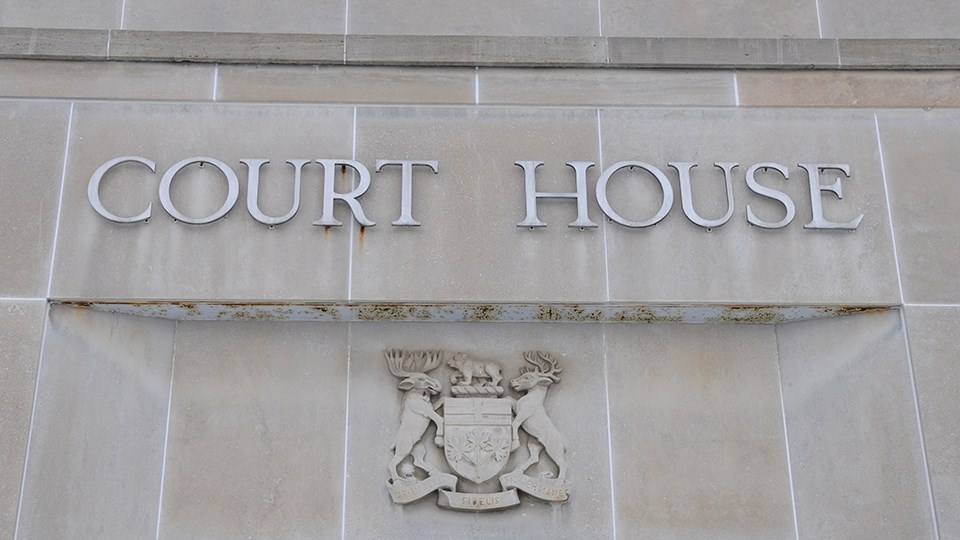A peace bond has been issued in the case of a Sudbury lawyer acquitted of sexual assault in September, but a charge of breaching release restrictions was withdrawn after extensive negotiations between Crown and defense, a Sudbury court heard today.
Adam Castonguay appeared in Sudbury court virtually on March 4, as did his lawyer, Stephen Proudlove, assistant Crown Attorney, David Kirk, and Justice Martin Lambert.
The Canadian government describes a peace bond as a protection order made by a court and “used where an individual (the defendant) appears likely to commit a criminal offence, but there are no reasonable grounds to believe that an offence has actually been committed.”
Castonguay, 29, was charged in January, 2021, with sexual assault, sexual assault-choking, and assault causing bodily harm for an alleged incident that took place in December, 2020. He pleaded not guilty to all charges.
A publication ban was in place to protect the complainant’s identity and evidence that would identify her during the trial, but it was made public as per the peace order proceedings today. Sudbury.com is not naming the person.
Upon acquitting Castonguay of all charges on Sept. 29, Justice Lori Thomas said she based her decision on the question of reasonable doubt.
“It may mean sometimes a guilty person is acquitted, but it is a necessary consequence to ensure that an innocent person is not convicted,” she said.
“This was not a credibility contest,” she said. “But I cannot disregard the fundamental principle of presumption of innocence.”
The Crown told the court today that while Castonguay was acquitted at trial, at one point, “he showed up at a location” that the complainant believed would have been a breach of the release document to which Castonguay was to adhere.
Kirk said that based on the initial assault charges (and despite an acquittal) as well as the complainant’s belief that Castonguay had breached his release order, “she has an ongoing apprehension of fear for her personal safety.”
When asked the defence’s position, Proudlove said “your Honor, without making any admissions regarding civil or criminal liability, the apprehension of fear, itself, is reasonable, strictly on the straight wording of the information.”
There were additional terms and conditions of the peace bond, but when asked by Lambert, Proudlove declined the need to read them on the record.
“It's been an ongoing negotiation between myself and Mr. Kirk, we've had some time to discuss them and also ample opportunity to discuss with Mr. Castonguay,” said Proudlove.
Kirk agreed. “We went through various iterations with regards to terms and this is what is agreed upon,” he said.
The agreed peace bond will last 12 months and be subject to a $500 fine if it is broken. Castonguay would be charged with breach of recognizance if he breaches the order.
The judge then read the details of the peace bond to Castonguay. He is not to contact the complainant in any way, directly or indirectly, except through legal counsel, he is not to attend the complainant’s workplace, and is not to be within 25 metres of any place the complainant is known to work, live or go to school.
As the complainant also works in the legal field, the exceptions include any “court appearances for yourself, firstly, secondly, for courthouse attendances in connection with your law practice, whether in person or virtual,” said Lambert. “And thirdly, to attend court to support your current partner during your ongoing family matters, limited to the actual start of the actual trial, actual court appearance until finished only and not for the entire court sitting. And lastly, you are not to harass or physically interfere with (the complainant). But you understand these conditions, sir?”
When asked if he understood the conditions, Castonguay asked for the specific terms of the 25-metre radius limitation, then agreed to all.
In a separate case, assault and forcible confinement charges against Castonguay from a different victim were dropped in early June 2021 after he agreed to enter into a common-law peace bond with the complainant.
Sudbury’s criminal court is not the only institution with limitations placed on Castonguay.
In 2021, the Law Society of Ontario moved to have Castonguay suspended due to the serious nature of criminal allegations against him, but were unsuccessful. Instead, the Law Society Tribunal Hearing Division placed restrictions on Castonguay’s ability to practice.
On Dec. 27, 2023, the tribunal’s panel considered Castonguay’s motion for termination of the practice restrictions based on his acquittal on the sexual assault charges, as well as the Law Society’s motion stating Castonguay breached his release on May 29 by allegedly attending the place of work of the complainant in his assault case and not immediately leaving when he learned the complainant was there. The Law Society order states Castonguay engaged “in intimidating behaviour towards the complainant, who is also the complainant in the respondent’s serious sexual assault trial, which has not yet concluded, by lingering in the [REDACTED] after a [REDACTED]asked him to leave.”
The panel ordered Castonguay must not communicate with the complainant, either directly or indirectly, and must not go to their house or place of work.
He is not restricted from going to the Sudbury courthouse, but, while there, must not communicate, directly or indirectly, with the complainant, who works in the legal field.
In order to respect the publication ban, the tribunal's reasons for decision were not released publicly.
The complaintant in Castonguay’s sexual assault case is also suing him in a Sault Ste. Marie court, seeking $13 million in damages.
Jenny Lamothe is a reporter with Sudbury.com.

